“At the same time, Estonia understands the importance of reforms, since we need a better, more competitive Europe that is closer to its citizens,” Paet emphasised.
Foreign Minister Paet stated that one essential pillar of a strong European Union is a well-functioning internal market, including a digital internal market. “Together we must make an effort to turn the potential of a single market into a functioning reality that raises the competitiveness of the EU,” said Paet.
During the meeting, Foreign Minister Hague confirmed that Great Britain, like Estonia, would like to develop the European Union’s single internal market. “In addition to a single market, we also feel that economic growth, creating new jobs, facilitating innovation, and concluding trade agreements with rapidly developing third countries is important,” said Paet, listing more examples of Estonia and Great Britain’s common interests in the EU.
When talking about the upcoming European Council, Paet and Hague also noted that they expect that an agreement will be reached regarding the European Union’s next budgetary period. “We hope that an agreement will be reached,” said the Estonian foreign minister.
Paet and Hague discussed the situation in Afghanistan and the need to expand civilian co-operation and development aid geared towards the country. “We have worked well together with Great Britain in Helmand Province for many years, and we would like to continue that co-operation in a new form after the removal of troops. For example, this year there are plans to send an Estonian expert to join Great Britain’s Department for International Development in Kabul,” said Paet. The foreign minister also confirmed that Afghanistan remains a development co-operation priority partner for Estonia and this year we will increase our support for Afghanistan even more.
Paet added that considering Estonia and Great Britain’s close ties in Afghanistan, the countries must also co-ordinate the reduction of their troops in Helmand Province.
